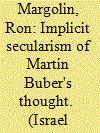| Srl | Item |
| 1 |
ID:
084518


|
|
|
| 2 |
ID:
165409


|
|
|
|
|
| Summary/Abstract |
This article recovers Martin Buber’s important but neglected critique of Carl Schmitt’s political theology. Because Buber is known primarily as an ethicist and scholar of Judaism, his attack on Schmitt has been largely overlooked. Yet as I reveal through a close reading of his Biblical commentaries, a concern about the dangers of political theology threads through decades of his work. Divine sovereignty, Buber argues, is absolute and inimitable; no human ruler can claim the legitimate power reserved to God. Buber’s response is to uncover what he sees as Judaism’s earliest political theory: a “theopolitics,” where human beings, mutually subject to divine kingship, practice non-domination. But Buber, I show, did not seek to directly revive this religious vision. Instead, he sought to incorporate the spirit of theopolitics, as embodied by Israel’s prophets, into modern society. The result is a new and significant perspective on liberal democracy and political theology.
|
|
|
|
|
|
|
|
|
|
|
|
|
|
|
|
| 3 |
ID:
105936


|
|
|
|
|
| Publication |
2011.
|
| Summary/Abstract |
With reference to Martin Buber's dialogical philosophy, the article identifies three dialogic imperatives that burden IR scholars. The first imperative is internal to the scholar. It is the intrapersonal imperative to conduct a dialogue with and in herself/himself. The second dialogic imperative is the interpersonal dialogue, which helps to establish a community of scholars. The third dialogic imperative is external to the community of scholars. It is the obligation to dialogically engage with the public to which the scholars belong. It will be shown that the third dialogic imperative is also a dialogic imperative to engage with truth about the public, that is, with social reality. I will end the article with a brief discussion on the Buberian dialogue within the context of the Israeli-Palestinian conflict.
|
|
|
|
|
|
|
|
|
|
|
|
|
|
|
|